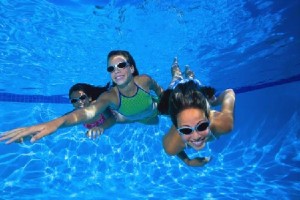 As the weather heats up, children are eager to dig out their swimsuits and head to the pool. Afternoons of swimming and splashing can be a lot of fun. But mixing kids with water can also result in tragedy. More than 1,000 children drown each year in lakes, pools and boating accidents nationwide. Drowning is the second leading cause of death of children ages 1 to 19, according to the American Academy of Pediatrics.
As the weather heats up, children are eager to dig out their swimsuits and head to the pool. Afternoons of swimming and splashing can be a lot of fun. But mixing kids with water can also result in tragedy. More than 1,000 children drown each year in lakes, pools and boating accidents nationwide. Drowning is the second leading cause of death of children ages 1 to 19, according to the American Academy of Pediatrics.
“Drowning happens quickly and silently, without splashing or screaming,” said Heather Trnka, injury prevention coordinator at Akron Children’s Hospital. “It can occur in just the few short minutes it takes to answer the telephone.”
All children should have swimming lessons, but never assume swimming lessons make your child “drown proof.” The American Academy of Pediatrics recommends swimming classes for children ages 4 and older.
Drowning is one of the most preventable causes of death and can be avoided by taking the proper precautions. The following tips will help keep your kids safe during an afternoon of fun at the pool:
– Never leave a child near a pool unattended even for a moment. It’s important to always supervise children while they’re in and near the water.
– Practice “touch” supervision with children younger than 5 years. This means that an adult is within an arm’s length of the child at all times.
– Teach your child to always swim with a partner.
– Enclose your pool in a safety fence at least 4 feet high with slats no more than 4 inches apart. The fence should completely separate the pool from the house and play area in the yard. The fence gate must have a childproof latch. Don’t leave furniture nearby as it could help a child climb over the fence.
– Learn CPR and post CPR instructions in the pool area. Have a phone nearby so you can call 911 in an emergency.
– Do not use air-filled swimming aids, such as “water wings,” as a substitute for adult supervision.
– Keep toys away from the pool when it is not in use as they can attract young children into the area.
– Never allow children to dive into an above-ground pool and check the water depth before allowing them to dive into an in-ground pool. Keep clear of the area near a diving board.
– Establish pool rules and post them near your pool. Don’t allow running or horseplay around the pool.
– Close supervision is just as important for inflatable and portable pools. A child can drown in just an inch of water. Kiddie pools should be emptied and stored out of reach when not in use.
– From a young age, encourage children to always swim with a buddy.
– When there are several adults present use the Water Watcher card strategy. This means one particular adult is the Water Watcher for a certain period of time (for example 15- minutes) to prevent lapses in supervision.



